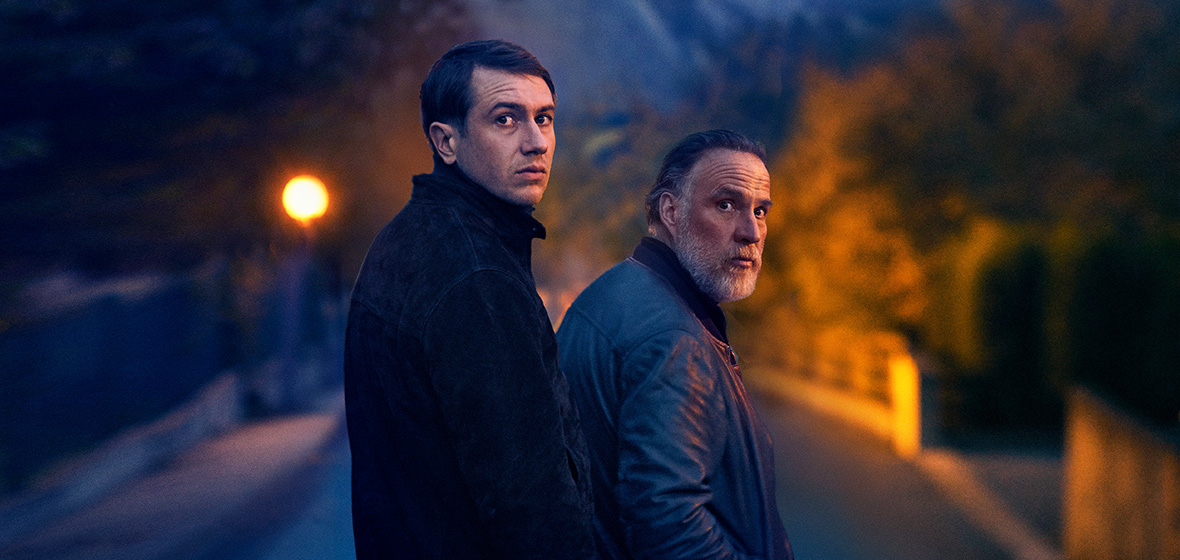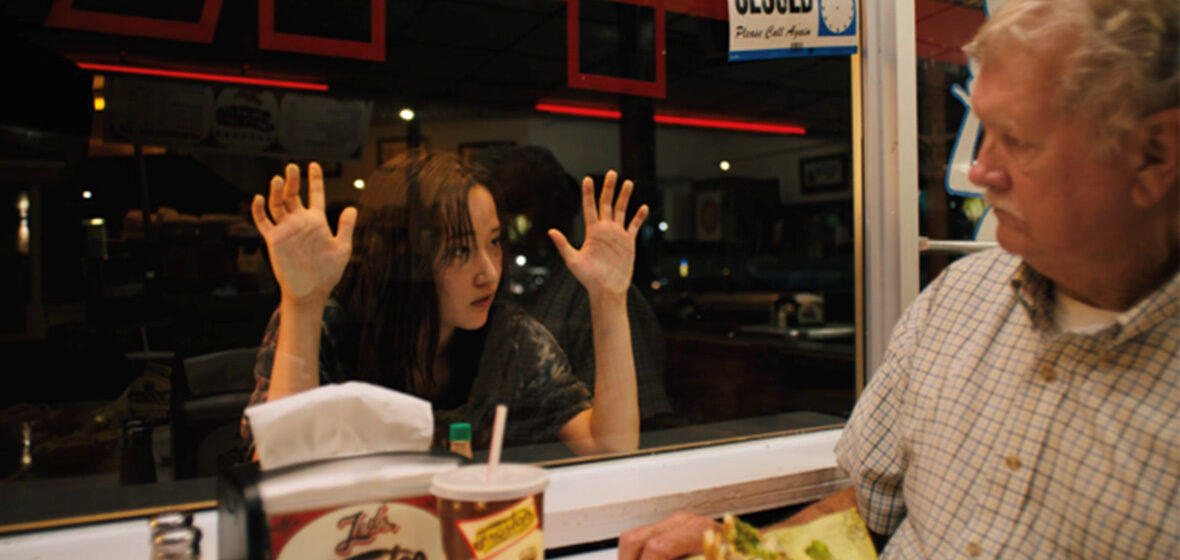Mona Lisa and the Blood Moon - 3 out 5 stars
The Night of the 12th - 3 out of 5 stars
Ana Lily Amirpour is an artist with a unique style, and that’s reason enough to celebrate her and watch her films. Born in England to a Persian family, Amirpour came onto the film scene with her dark and deeply original A Girl Walks Home Alone At Night, the 2014 Iranian black-and-white female vampire film that gathered a strong cult following. Her next offering was a larger budget cannibalism-dystopian revenge thriller, The Bad Batch, a colourful but violent desert fever dream of a film that failed to attract the same interest as her first feature. A Girl Walks Home Alone At Night’s setting of feminine power in a repressive society appealed to western film critics, who didn’t connect when The Bad Batch shone a spotlight on their own reality.
I like Amirpour. I admit to not fully connecting with her style, but I appreciate the visual language she’s exploring; it’s adamantly rebellious, as if she’s looking for inspiration beyond the usual cinema masters. She reminds me of Karyn Kusama, another female director from a mixed background who has been deconstructing genres through a female lens, with compelling, if mixed, results.
Amirpour takes an almost surrealist turn for her third feature, though losing a little of the visual edge that characterised her earlier work. It’s a strange film, but a gripping one. And it doesn’t try to sell you something it’s not willing to offer. Right at the start, in a perfect moment of self-awareness, police officer Harold (Craig Robinson) reads a fortune cookie message that says, “Forget what you know”. In case you miss it, Amirpour is talking to the audience.
The film starts with a young girl escaping a mental asylum with the help of her mind-control powers. She’s Mona Lee (Jun Jong See), and we don’t find much about her in the course of the film. No one knows how she ended up in the hospital, only that for decades all she’s done is stare and drool — until the day she perks up and attacks the bully nurse cutting her nails. Drifting away, lost, Mona Lee creates a little havoc everywhere she goes until she catches the eye of the officer assigned to find her, the above-mentioned Harold, as well as that of a drug dealer named Fuzz (Ed Skrein) and Bonnie (Kate Hudson), a single mother and exotic dancer who gives shelter to Mona Lisa and in exchange uses Mona’s powers to steal from her clients.
Because she behaves like a curious child in an adult world, Mona Lisa is able to befriend Bonnie’s son Charlie (Evan Whitten), and the two find a way to support each other emotionally. Having had to manage the trauma of having a mother who is all but absent, Charlie sees in Mona Lisa a protective sister who offers the closest semblance to a family he’s ever seen. Mona, with the police on her tail, finds in her relationship with Charlie the chance to offer altruistic love.
In a way, this film reminded me of Titane. Thematically both movies couldn’t be further apart, but in both there is a female protagonist with peculiar powers who overcomes the burden of those powers to find family love; both films also view the underworld of society with affection. It’s not the setting that is violent; it’s not the gangs or the drug dealers, but those in the society who utilise their coercive power to take control. Criminals, clients of the strip club where Bonnie works, and whose abuse led her to be the self-centred grifter she is, are probably the ones who locked Mona Lisa up and subjected her to further emotional pain. Mona Lisa eventually finds a way out — with the help of both Charlie and Fuzz — while Bonnie will forever remain a consequence of the place she lives in. The film’s ending seems to warrant a “to be continued” caption, as if we’ve just seen the first chapter in the origin story of a comic book superhero.
I admit that Mona Lisa and the Blood Moon isn’t for everyone. It’s strange to say this, but I found myself wishing for a little bit more graphic violence — the film earns the right to go further, and this treatment would fit the story well, and potentially garner more cult interest. Not that Amirpour cares. She is way above that.

If Mona Lisa and the Blood Moon is a hyper-stylistic urban fantasy, The Night of the 12th is so grounded in reality it doesn’t waste time on feeble things like characterisation or context. It’s straightforward, contains no time-wasting features, and is bad procedural crime investigation at its best.
The film is based on Pauline Guéna’s investigative book recounting the year she spent shadowing a department of the French Police Judiciary (PJ) — the department responsible for investigating serious crimes, including particularly violent murders and terrorism, and for seeking to resolve missing persons cases.
In the book, Guéna looks into all the crimes the PJ is responsible for, but in the film adaptation Dominik Moll and his writing partner Gilles Marchand focus the action on a single case, to encapsulate the pressure on the agents. They conflate into one case, the brutal murder by immolation of a young teenager, elements of several real cases. The film’s subtitle tells us at the start that this is one of the many cases that go unsolved, thereby preventing us from setting up an expectation of a happy ending. The Night of the 12th is so grounded in reality it doesn’t even provide the satisfaction of a conclusion.
In the grand scheme of the investigation, the protagonists are barely interesting. There’s the stoic commander Vivés (Bastien Bouillon), who dedicates so much of himself to his work that his own personality cannot be separated from it. His hot-headed, about-to-be-divorced partner Marceau (Bouli Lanners) and other colleagues come and go whenever necessary.
In the beginning, the case looks straightforward. Clara (Lula Cotton-Frappier) leaves her friend’s party late at night, and on her way home is accosted and set her on fire. We don’t find out whether the small community where this happens was shocked by the crime. This is irrelevant to the investigation, and therefore seemingly unnecessary to depict. Everything in the film is stern and humourless; any exposure of emotion appears to be awkward, mainly when dealt with by Vivés, a man so out of touch with his emotional side that he can’t even find it in him to tell a grieving mother her daughter is dead.
Part of the investigation takes the form of interrogating the many men Clara was involved with: the one she had a crush on; the one she slept with on occasion; the one obsessed with her who may or may not be lying about having slept with her; and the one secretly involved with her. It’s interesting how, as an audience, we can’t escape creating our own narrative and characterisation of Clara, developing an entirely one-sided view because it’s being influenced by emotionless robots. In one of the film’s best moments, Clara’s best friend Nanie (Paulien Series) accuses a clueless Vivés of trying to portray Clara as a libertine, seemingly unaware of how much this upsets those who cared for her.
In a way, The Night of the 12th feels like a true crime podcast and is a timely reminder, for me, of how most of us consumed the investigation and the narrative of the Adnan Syed case. For non-professionals, it’s easier to build a person’s character based on the minimal information we have. Good investigators, the film tries to say, are above that.
The other direct reference is David Fincher. I don’t know if Moll has admitted, or tried to downplay, the influence of the American filmmaker, but after watching The Night of the 12th one feels the connection is undeniable. Fincher is also known for his obsession with the truth of things, to the detriment of creating an emotional connection. If you need inspiration, find it with the best, and Fincher is definitely one of the best out there. But even if Moll understands he should incorporate some of the most exciting aspects of Fincher’s work — such as his demonstration that, more often than not, clues come to detectives almost by accident and not because of the power of deduction — Moll limits himself to stylistic choices that are carbon copies of Fincher’s filmography. There’s Zodiac there, and Gone Girl, and the soundtrack is an ominous piano crescendo that could have been taken from a Trent Reznor/Atticus Ross score.
If anything, being too close to Fincher hurts Moll’s ambitions, but it does create a familiarity he may feel was needed by the unsuspecting audience. The Night of the 12th reminds me of another French police drama based on the real-life story of police officers —2011’s Polisse. But that film directed the focus right at the police officers and the way they dealt emotionally with the horrors embedded in daily life. Polisse was, because of that, a harsh and emotionally draining watch and, even though a brilliant film, didn’t do very well with the public. Moll’s solution for The Night of the 12th is to leash the humanity it depicts.
This film omits matters of the heart, focusing on the cerebral — the power of the brain to find solutions. I give credit where it’s due to this filmmaker, for this coherent treatment of the need to focus on the intellect rather than emotion.




